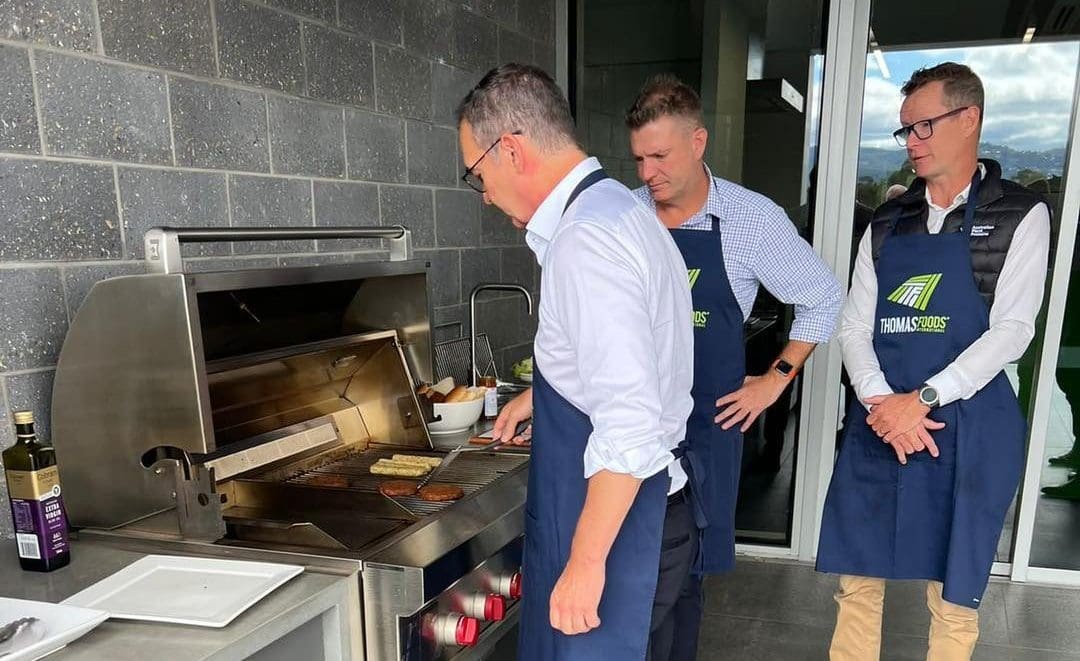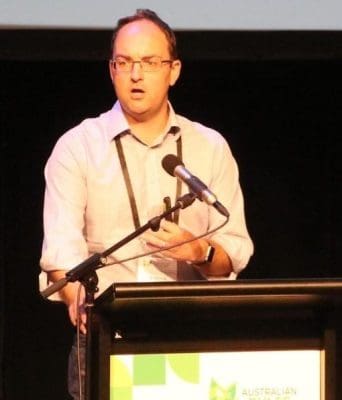
Then South Australian Premier Steven Marshall with TFI CEO Darren Thomas and APP managing director Brendan McKeegan ahead of the 2022 SA election.
A JOINT investment by the Federal and South Australian governments announced last year to kick-start a plant-protein manufacturing sector in SA appears to have been shelved.
Ahead of last year’s South Australian election, $113 million from the Federal Government and $65M from SA coffers under the Liberal government of Premier Steven Marshall, who lost office in the 19 March 2022 poll to the ALP’s Peter Malinauskas, was announced.
From the outset, details of the spend were unclear, with Bunge joint venture Australian Plant Proteins, international pulse trader Australian Milling Group and major southern Australian meat processor Thomas Foods International all named in the partnership.
While APP has advised Grain Central it is forging ahead with plans to expand its operation over the border at Horsham in Victoria, neither TFI or AMG, the Australian arm of Canadian-based AGT Foods, have responded to inquiries about the funding.
The Federal Government’s Business website states a grant of $113 million was offered to Australian Plant Proteins for a project costed at $378M under the Modern Manufacturing Initiative – Manufacturing Collaboration Stream.
When contacted by Grain Central about the status of the grant, the Federal Government’s Department of Industry, Science and Resources pointed back to the website, which lists nine projects, none of them related to plant protein.
In a state where the loss of the car industry a decade ago is still being felt in the manufacturing landscape, an SA Government spokesperson indicated an investment in plant protein might yet take shape.
“Discussions are ongoing between the Federal Government, State Government and plant protein industry to support the sector,” the spokesperson said.
“The Malinauskas Government recognises the growing global demand for high-quality plant proteins and the local jobs and exports boost this industry can create.
“We also know the importance of attracting national and global investment to our state, which is why we re-established Invest SA, scrapped by the former Liberal Government, to grow our economy and help funnel $1 billion into SA in just its first year.”
APP co-founder and executive director Phil McFarlane in April last year said the facilities to be built on three separate SA sites using Federal and SA as well as private funds would each process about 8000 tonnes of pulses per annum.
Questions from the start
Industry sources have said the project’s failure to take shape is tied more to difficulty in figuring out which stakeholder pays for what, rather than a lack of viability in the plant-protein sector.
With TFI as a meat processor with a cold chain, AMG as a bulk-handler and trader of pulses, APP as a start-up pulse fractionator, and two governments, it is not hard to see how stakeholders were coming at what seemed more like a concept than a plan.
“With the grants, they had the money before they knew what they were going to do with it,” one source said.
“I think South Australia could become a plant-protein manufacturer, but what was announced last year was going to be huge.
“Starting small might be the answer.”
Another source said the proposed developments were an attempt to take SA, already one of the world’s biggest lentil and faba bean exporters, beyond the bulk commodity market centred on South Asian and Middle East demand.
“What they wanted was a higher-end product to go into refrigerated western-style foods,” the source said.
“There are some reasonable questions over where the value is in fractionation.”
“A lot of money has been spent on plants outside Australia and what some companies have ended up with is idle capacity.”
APP on track in Vic, progress at Unigrain
In Victoria, traction in plant-protein manufacture has already been achieved with APP’s Horsham plant, which is using primarily faba beans to make a high-quality isolate meeting strong demand for the human-consumption market.
Fractionation’s by-product is starch, some of which APP sells into the feedlot sector, and the business is building a second line at Horsham.
“APP is still committed to our expansion plans to build a bigger plant-protein processing footprint in Australia off the back of the current growing demand we have for our products,” APP’s Phil McFarlane told Grain Central.
In April last year, APP was reported to be producing about 1500t of protein isolates annually at their Horsham site from close to 8000t of pulses.
The second line of the Horsham facility, which is currently in construction, will manufacture a further 5500t of isolates each year.
Unigrain has been operating since the 1970s and has facilities in Western Australia and Victoria that process oats and pulses for domestic and export markets.
Unigrain co-CEO Andrew May said its pulse-protein plant was about to be commissioned.
“We’re very excited to commence commercial production in September, and based on the conversations we’re having in the market, we’re very optimistic about the potential of our products,” Mr May said.
“Initially we’ll be focusing on faba beans and field peas, and we also see potential for other pulses including chickpeas, lentils and mungbeans.”

Speaking at the Australian Pulse Conference in March, Unigrain co-CEO Andrew May said pulse protein was on a long path to success. Photo: Emma Alsop
Mr May said Unigrain expected to be fractionating 10,000-20,000t per annum of pulses within two years, with isolates selling into domestic and export markets.
Under its Essantis brand, product made from field peas will be 55 percent protein, while the faba bean product will be 60pc protein.
“The domestic application is for both human and petfood applications.
“There’s significant demand in the petfood sector for protein and also starch, and it will be an excellent replacement for imported tapioca and corn starch.”
Mr May said the starch’s dry format makes it appealing to those chasing inputs for animal diets.
“For either human or pet food, its provenance and traceability of ingredients and its low carbon footprint, as well as its low-allergen status…make it increasingly desirable for labelling.”
This is in contrast to soy.
Mr May said the pulse-fractionation process can therefore go into products labelled as allergen and gluten free.
Grain Central: Get our free news straight to your inbox – Click here

HAVE YOUR SAY